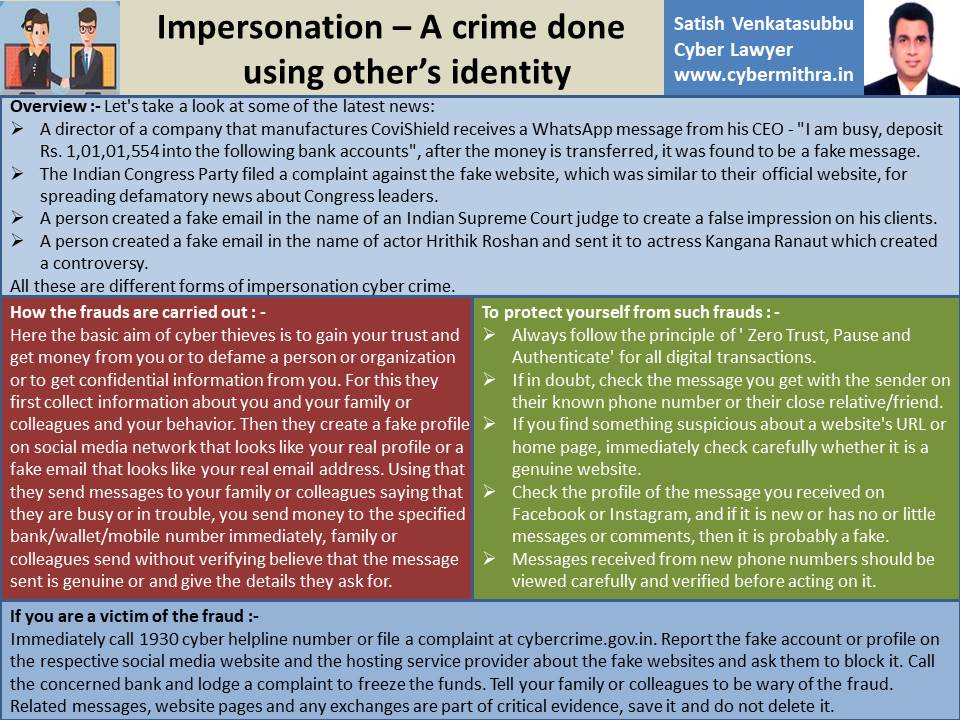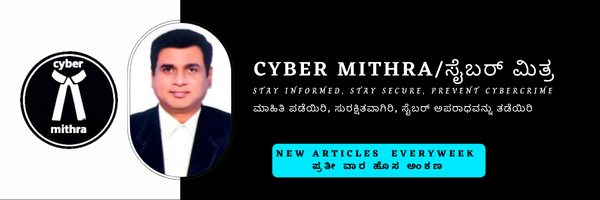Impersonation Fraud – A crime done using other’s identity
Impersonation fraud cyber crime is a type of fraud where an attacker poses as a trusted person to steal money or sensitive information from a company. Let’s take a look at some of the latest news:
- A director of a company that manufactures CoviShield receives a WhatsApp message from his CEO – “I am busy, deposit Rs. 1,01,01,554 into the following bank accounts”, after the money is transferred, it was found to be a fake message.
- The Indian Congress Party filed a complaint against the fake website, which was similar to their official website, for spreading defamatory news about Congress leaders.
- A person created a fake email in the name of an Indian Supreme Court judge to create a false impression on his clients.
- A person created a fake email in the name of actor Hrithik Roshan and sent it to actress Kangana Ranaut which created a controversy.
All these are different forms of Impersonation cyber crime.
How the Impersonation fraud works :-
Here the basic aim of cyber thieves is to gain your trust and get money from you or to defame a person or organization or to get confidential information from you. For this they first collect information about you and your family or colleagues and your behavior. Then they create a fake profile on social media network that looks like your real profile or a fake email that looks like your real email address. Using that they send messages to your family or colleagues saying that they are busy or in trouble, you send money to the specified bank/wallet/mobile number immediately, family or colleagues send without verifying believe that the message sent is genuine or and give the details they ask for.
How you can protect yourself from Impersonation fraud :-
- Always follow the principle of ‘ Zero Trust, Pause and Authenticate’ for all digital transactions.
- If in doubt, check the message you get with the sender on their known phone number or their close relative or friend.
- If you find something suspicious about a website’s URL or home page, immediately check carefully whether it is a genuine website.
- Check the profile of the message you received on Facebook or Instagram, and if it is new or has no/little messages or comments, then it is probably a fake.
- Messages received from new phone numbers should be viewed carefully and verified before acting on it.
If you have been scammed of Impersonation fraud :-
Immediately call 1930 cyber helpline number or file a complaint at cybercrime.gov.in. Report the fake account or profile on the respective social media website and the hosting service provider about the fake websites and ask them to block it. Call the concerned bank and lodge a complaint to freeze the funds. Tell your family or colleagues to be wary of the fraud. Related messages, website pages and any exchanges are part of critical evidence, save it and do not delete it.
Legal remedies available to the victim :-
One can register a criminal case in cyber police station under
- section 419 (punishment for cheating by impersonation) and 420 (cheating and dishonestly inducing delivery of property) of Indian Penal Code(IPC).
- section 43 (Penalty and compensation for damage to computer, computer system, etc), section 66 (punishment for computer related offences – a person committing data theft, transmitting virus into a system, destroying data, hacking, or denying access to the computer or network to an authorized person is imprisoned for a maximum of 3 years or a fine of 5 lakh rupees or both), section 66C(which prescribes penalties for identity theft and states that anyone who fraudulently or dishonestly uses a person’s identity information will be subject to imprisonment up to 3 years and a fine of up to 3 lakh rupees) and Section 66D (punishment for fraud by impersonation using computer resources) under of the Information Technology Act(IT) Act 2000.

If you find this useful, please like it and share, also if you have any questions or topics you want me to cover please add them in the comments section. Also you can share one page poster covering the entire content with your friends and relatives in other social media.
You can find similar useful articles related to various cybercrimes at www.cybermithra.in website maintained by me in Kannada and English.
#share #socialmedia #like #cyber #Impersonationfraud #IdentityTheft #cybercrimeawareness #cybermithra #legal #content #impersonation, #cybercrimebyimpersonation #whattodoifsomeoneisimpersonatingyou

